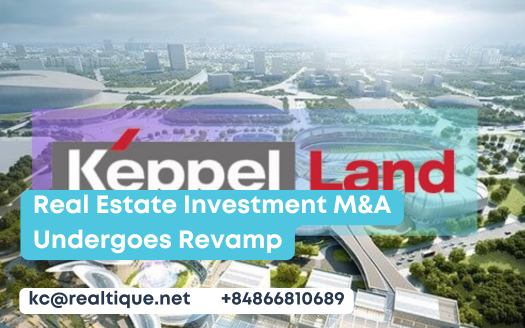Real Estate Investment M&A Undergoes Revamp
In light of current market fluctuations, a notable real estate investment project is undergoing an extensive revamp aimed at aligning with shifting investor expectations and innovative design trends. This alteration not only seeks to enhance sustainability but also positions the project to capitalize on emerging investment opportunities, particularly amid anticipated regulatory changes. As the environment evolves, the implications for both local and foreign investors could be significant, raising questions about the future path of similar initiatives. What strategies will be employed to steer through these intricacies, and what can be learned from this pursuit?
Table of Contents
Current Market Dynamics
The dynamism of the real estate market in recent months has been characterized by strong growth and strategic realignments among key players.
The first nine months of the year witnessed a substantial increase in transaction values, reaching several hundred million USD, with 11 notable mergers and acquisitions reported. These transactions primarily focused on the residential, industrial, and logistics sectors, highlighting changing investor interests. Notably, nine of these transactions exceeded 1.8 billion USD, underscoring heightened market activity.
The growing inclination towards property development and strategic partnerships further accentuates the market’s strength. As financial constraints and rising costs challenge some firms, the overall climate remains optimistic, with opportunities for innovation and foreign investment emerging as critical drivers for future growth.
Recent activity in key investment transactions highlights the strong nature of the real estate market amid ongoing strategic realignments.
The first nine months of the year recorded over 11 successful mergers and acquisitions, with nine transactions surpassing 1.8 billion USD, primarily in the residential, industrial, and logistics segments.
Notable transactions include Keppel Land’s sale of a 70% stake in Saigon Sports City, valued at over 7,400 billion VND, and KIDO Group’s acquisition of a 75% interest in Hung Vuong Plaza management center.
Additionally, Kim Oanh Group’s partnership with Japanese firms for The One World project and Hoan Sinh Gia Lai’s hotel transfer to Mường Thanh Group further exemplify the vigorous investment environment, reflecting heightened investor interest in property development.
Emerging Investment Trends
As strategic acquisitions and mergers continue to shape the real estate environment, a notable shift in investment trends is emerging.
The current setting reveals a strong inclination towards high-value transactions, particularly in the industrial and logistics sectors, reflecting a growing demand for infrastructure and supply chain solutions.
Investors are increasingly pursuing strategic partnerships and development projects, with residential and commercial real estate becoming focal points for future investments.
Notably, regulatory changes are anticipated to influence investment strategies, encouraging a more adaptive approach among stakeholders.
Additionally, the ongoing interest in foreign investments indicates a potential influx of capital, particularly in high-quality projects, suggesting that the real estate market is ready for sustained growth and diversification.
Challenges in the Sector
Challenges confronting the real estate sector are complex, stemming from financial constraints and changing regulatory structures. Many firms are struggling with limited capital influx, which hampers their ability to pursue new projects and maintain existing ones.
Additionally, rising development costs necessitate significant financial restructuring, further complicating investment strategies. The changing legal systems can lead to delays in project completions, impacting timelines and profitability.
Furthermore, market stability remains precarious, influenced by fluctuating economic conditions and stringent regulatory environments. While opportunities for foreign investments are emerging, particularly in high-quality projects, the challenge lies in navigating the administrative obstacles and potential barriers to market access.
Addressing these challenges is essential for sustaining growth and attracting investment in the sector.
Future Market Outlook
The future market outlook for real estate investment appears promising, driven by an anticipated influx of foreign capital and increasing demand for high-quality projects.
Experts predict that from 2024 to 2026, M&A activities will remain strong, reflecting investor confidence in the sector. A significant shift towards residential and commercial developments is expected, with a particular focus on industrial and logistics segments, which have shown resilience.
While regulatory changes may pose challenges, they also present opportunities for streamlining investment processes.
Financial restructuring will be essential for firms facing rising development costs, yet the changing legal structures are likely to enhance market accessibility for foreign investors.





